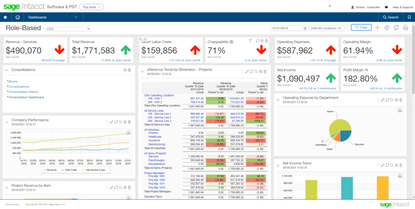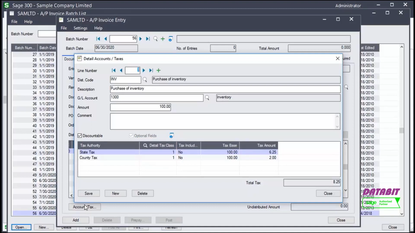Sage Intacct vs. Sage 300
We’ve conducted a hands-on review of Sage Intacct and Sage 300. In comparing the two Sage products, we’ll examine their strengths and weaknesses and help you identify the best fit for your business.


Sage Intacct Overview
Sage Intacct was launched in 1999 by the Intacct Corporation and was one of the first cloud-based accounting solutions at the time. In 2017, the Sage Group acquired the software and rebranded it as Sage Intacct.
Sage Intacct is a feature-rich, GAAP-compliant financial management software favored for its multi-entity, multi-currency, and project accounting support. It also provides over 150 pre-built reports and customizable dashboards with real-time KPIs. The system also features strong integrations with CRMs like Salesforce and eCommerce platforms like Shopify.
While praised for its intuitive user interface and scalability, it has a few limitations. Notably, budgeting and interactive reporting are extra costs, and there’s no mobile app available.
Sage 300 Overview
Previously known as ACCPAC, Sage 300 is a modular ERP system designed for small and medium-sized businesses. It stands out for its multi-currency and multi-company capabilities, making it a good fit for global businesses. The system is known for its strong financial module and customization options, particularly with Sage 300 CRE Report Designer.
Sage 300 can integrate with Sage Intelligence for reporting and BI tools and various inventory, document management, eCommerce, and CRM platforms. We also like that it can accurately track project expenses and billable hours, as well as track stock levels across multiple locations.
However, due to its high learning curve, Sage 300 can be challenging for new users. It also has a somewhat outdated user interface, and some users have reported performance issues, particularly with large datasets.
Target Market Comparison
Sage Intacct primarily serves SMBs with 15 to 500 employees and an annual revenue between $5 million and $100 million. The software caters to various industries, including professional services, healthcare, computer software, nonprofits, and accounting.
Sage 300 is also designed for small to medium-sized businesses with 10 to 500 employees. These companies typically have an annual revenue of $1 million to $50 million. Sage 300 suits various industries, mainly construction, information technology, real estate, computer software, and nonprofits. Most users are based in the United States and Canada.
Sage Intacct vs Sage 300: Which is Better for Most Businesses?
For most businesses, especially those with a greater need for scalability and multi-entity support, Sage Intacct is likely the better choice. Its simple, responsive user interface and superior integration capabilities offer a more streamlined user experience. However, Sage 300 may be a better fit for businesses that require multi-currency support and financial modules.
For a broader look at other options, check out our roundup of the best ERP software available.
